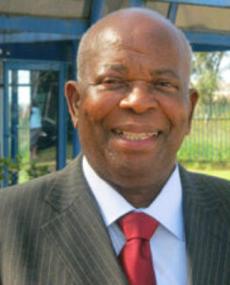
David Thebehali was born on 3 June 1938 in Orlando East, Soweto. His parents were among the earliest residents of Soweto. From 1945 to 1952 he was a pupil at St. Mary’s school in Orlando and went on to attend St.Peter’s (now St. Martin’s, Victoria) until 1955. The head of this school was Father Trevor Huddleston, who influenced David’s political views. The school was instrumental in shaping political activists such as Oliver Tambo and Zakes Mphahlele. In 1954, when the apartheid government introduced separate education, Huddleston refused to co-operate.
In 1957 Thebehali completed matric. He began working at a motor spares dealer and later at a lampshade company, to save for a university education. In 1960 he enrolled at the University of Lesotho for a Bachelor of Science degree but had to withdraw after two years for lack of money. From 1961 to 1963 he worked in the Botany department at the University of Witwatersrand during which time he also married. He then enrolled with the University of the North (popularly known as Turfloop) but continued to work at a newsagent and stationery shop.
At Turfloop, Thebehali was exposed to Pan Africanism and Black Consciousness. He did not join the Pan Africanist Congress (PAC) when it was formed in 1959, but played a role in the organisation. He attended the founding meeting that was held at the Orlando Community Hall, chaired by Robert Sobukwe. Thebehali joined the Progressive Party (PP) under Helen Suzman. He served as President of the Youth Wing of the PP. He worked closely with Percy Qoboza, who became a leading journalist and editor of The World.
In 1968 Thebehali offered to represent White City Jabavu at town council level. In 1976 he became the head of the Council’s Department of Health and Education and warned government of the growing anger among black students to being taught in Afrikaans. He led a delegation to lobby the Transvaal Department of Bantu Education on the issue but found the reception unsympathetic.
The June 1976 riots erupted and the target of popular anger was Councillors and other state employees regarded as co-operating with and serving the apartheid Regime. The people demanded their resignation and after Thebehali failed to do so, he was termed a sellout, working with apartheid for his own self interest.
In 1978 David was nominated Mayor of Soweto. His term of office lasted until the Rent boycotts saw him lose this position. Despite his moderate leanings, he made a significant achievement in the electrification of Soweto. He had managed to fundraise from various South African banks to finance the electrification project worth R268 million.
Thebehali also sourced international loans for new sewage and water pipes and the construction and improvement of roads in Soweto. He instrumental in the establishment of the Soweto College of Education, a project funded by Anglo American, and took part in the re-location of Vista University (Soweto Branch). Thebehali helped with various other township improvements including housing, clinics and served on the served on the Board of Baragwanath Hospital. In 1984 he established his own church, the Fourways Ministries, with 2500 members. In 1999 he oversaw the handing of Title Deeds to residents of Meadowlands and Diepkloof who had been long paying tenants of these properties. In 2002 Thebehali became the non-Executive chairman of Putco, a bus company. He currently resides in Booysens, Southern Johannesburg.